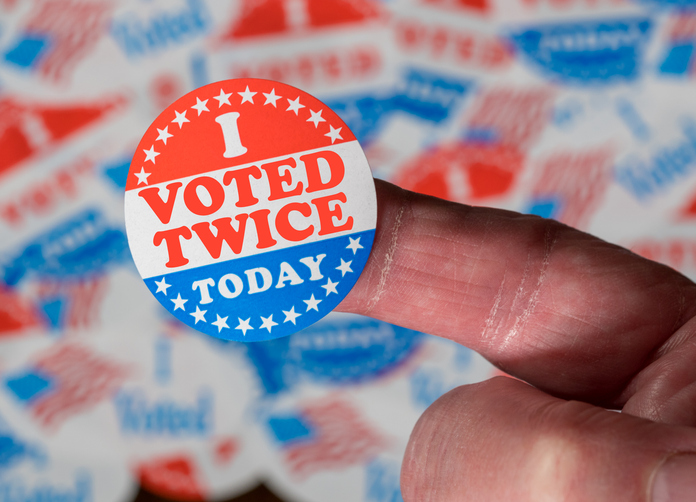Furthermore, “An additional 23 counties have active-voter registration rates that exceed 90 percent of adult citizens over the age of 18. That figure far eclipses the national and statewide voter registration rate in recent elections,” according to the lawsuit filed against Michigan Secretary of State Jocelyn Benson, a Democrat.
In Nevada, the Republican National Committee, the Nevada Republican Party, and a Nevada voter recently sued Nevada Secretary of State Cisco Aguilar, also a Democrat, alleging that, “Nevada’s impossibly high registration rates, large rates of inactive registered voters, low numbers of removals, and inconsistent enforcement across counties indicate an ongoing, systemic problem with its voter-list maintenance efforts.”
“Election integrity starts with clean voter rolls, and that’s why the National Voter Registration Act requires state officials to keep their rolls accurate and up-to-date,” Republican National Committee chair Michael Whatley said in refence to the two lawsuits.
Most recently, the Arizona Republican Party and the Arizona Free Enterprise Club filed a lawsuit against Democrat Arizona Secretary of State Adrian Fontes alleging that, “Because the secretary does not maintain accurate voter rolls, ineligible voters have an opportunity to vote in Arizona elections, risking the dilution of plaintiffs’ legitimate votes.”
“Accurate voter rolls are the bedrock of our constitutional republic,” said Gina Swoboda, Chair of the Arizona Republican Party. “The rampant presence of ineligible voters on our rolls is unacceptable and undermines the trust Arizonans place in our electoral process.”
According to the Arizona lawsuit, there are 500,000 to 1.2 million voters still listed on Arizona’s voter roll who should have been removed for a variety of reasons.
Both Michigan and Arizona allow for “no excuse” mail-in voting. Nevada, along with seven other states and the District of Columbia, goes one step further, allowing for universal mail-in voting. This means that every single voter listed on the rolls of these states receives a mail-in ballot, regardless of whether or not they requested a ballot to be sent.
Before the 2020 election, mail-in voting was universally regarded as an inferior voting method due to the fact that it makes illegal voting too easy. For instance, in 2005, former President Jimmy Carter and former U.S. Secretary of State James Baker issued a report titled, “Building Confidence in U.S. Elections,” in which they noted that mail-in voting “increases the risk of fraud” and “absentee balloting…has been one of the major sources of fraud.” The report also found, “a substantial number of Americans are registered to vote in two different states.”
In 2012, the Pew Center on the States analyzed state voter registration rolls and found, “Approximately 24 million—one of every eight—voter registrations in the United States are no longer valid or are significantly inaccurate. More than 1.8 million deceased individuals are listed as voters. Approximately 2.75 million people have registrations in more than one state.”
That same year, The New York Times ran an article titled, “Error and Fraud at Issue as Absentee Voting Rises,” which concluded that “votes cast by mail are less likely to be counted, more likely to be compromised and more likely to be contested than those cast in a voting booth.”
Even NPR admitted in mid-2020 that “Mail-in voting…is fraught with potential problems.”
This all came to a head in the 2020 presidential election, when mail-in voting became a hot topic in light of the COVID-19 pandemic. In 2020, nearly half of all voters cast a vote by mail, 27 percent voted in-person well before Election Day, and less than 30 percent actually showed up to vote in-person on Election Day.
For comparison, in 1992, more than 90 percent of voters cast ballots in-person on Election Day. More recently, in 2016, more than 60 percent of voters cast their ballots in-person on Election Day.
In late 2023, The Heartland Institute and Rasmussen Reports conducted a poll that found that at least one-in-five voters who cast mail-in ballots during the 2020 presidential election admitted to committing at least one kind of illegal voting act.
Specifically, 21 percent of mail-in voters admitted that they filled out a ballot for a friend or family member; 19 percent of mail-in voters admitted that a friend or family member filled out a ballot on their behalf; 17 percent of mail-in voters admitted that they voted in a state where they are no longer a permanent resident; and 17 percent of mail-in voters said they signed a ballot for a friend or family member with or without his or her permission.
In early 2024, we followed up with another poll, which found that nearly three in 10 voters admit they would engage in at least one kind of illegal voting act in the 2024 election.
Specifically, 28 percent of Americans admit they would commit at least one of the following illegal actions in the 2024 election: vote in multiple states; destroy mail-in ballots of friends or family members; pay or offer rewards to fellow voters; deliberately provide incorrect information about the place, time, or date associated with casting a ballot; and/or alter candidate selections on mail-in ballots.
With less than five months before the 2024 election, it is absolutely imperative that all states—not just Arizona, Michigan, and Nevada—clean up their voter rolls. The clock is ticking. It is not too late, but states must act swiftly to ensure that the 2024 election is, indeed, as free and fair as possible.
Chris Talgo (ctalgo@heartland.org) is editorial director at The Heartland Institute.
Originally published by Townhall. Republished with permission.
For more Budget & Tax News.
